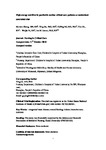High-energy nutrition in paediatric cardiac critical care patients: a randomised controlled trial
| dc.contributor.author | Zhang, H | |
| dc.contributor.author | Gu, Y | |
| dc.contributor.author | Mi, Y | |
| dc.contributor.author | Jin, Y | |
| dc.contributor.author | Fu, W | |
| dc.contributor.author | Latour, Jos M | |
| dc.contributor.editor | Albarran J | |
| dc.contributor.editor | Scholes J | |
| dc.date.accessioned | 2018-12-02T11:26:55Z | |
| dc.date.issued | 2018-12-09 | |
| dc.identifier.issn | 1362-1017 | |
| dc.identifier.issn | 1478-5153 | |
| dc.identifier.uri | http://hdl.handle.net/10026.1/12966 | |
| dc.description.abstract |
Background: Previous studies have shown that feeding high-energy formula to infants after cardiac surgery increased energy intake with fewer side effects on cardiopulmonary function. However, impacts on weight gain and gastrointestinal function remain unclear. Aims: To determine the impact of high-energy formula compared to standard formula on weight gain and gastrointestinal tolerance in postoperative infants with congenital heart disease. Design: Randomised Controlled Trial. Method: The setting of the study was at a 20-bed Cardiac Intensive Care Unit at a tertiary children’s hospital in China. Study population were infants <1 year of age who underwent cardiac surgery were allocated to the intervention group (n=32) and control group (n=32). The intervention group received high-energy formula (100kcal/100 mL) and the control group received standard formula (67kcal/100 mL) for 7 days during the stabilized postoperative period at the Cardiac Intensive Care Unit. Primary outcomes were weight gain and gastrointestinal intolerance. Secondary outcomes were energy intake and standard intensive care characteristics. Results: Infants who received high-energy formula (n=30) showed greater mean weight gain than those who received standard formula (n=29); -16g (95% CI: -74 to 42) versus -181g (95%CI: -264 to -99), P =0.001. The evaluation of gastrointestinal intolerance showed that the intervention group had several side effects, such as abdominal distension (n=1), gastric retention (n=2), and diarrhea (n=1), while the control group had no problems. Enteral energy intake in the intervention group was higher than control group from day three. Conclusion: Infants after cardiac surgery fed with high-energy formula gained more weight but had increased feeding intolerance. However, the feeding intolerance symptoms could be relieved by medication and did not affect feeding advancement. Relevance to Clinical Practice: Paediatric intensive care clinicians should consider gradually increasing energy density of the formula during feeding and assess feeding intolerance signs in children with malnutrition after cardiac surgery. | |
| dc.format.extent | 97-102 | |
| dc.format.medium | Print-Electronic | |
| dc.language | en | |
| dc.language.iso | en | |
| dc.publisher | Wiley | |
| dc.subject | Congenital heart disease | |
| dc.subject | Enteral feeding | |
| dc.subject | infant | |
| dc.subject | intensive care | |
| dc.subject | nutrition | |
| dc.title | High-energy nutrition in paediatric cardiac critical care patients: a randomised controlled trial | |
| dc.type | journal-article | |
| dc.type | Journal Article | |
| dc.type | Randomized Controlled Trial | |
| dc.type | Research Support, Non-U.S. Gov't | |
| plymouth.author-url | https://www.webofscience.com/api/gateway?GWVersion=2&SrcApp=PARTNER_APP&SrcAuth=LinksAMR&KeyUT=WOS:000461516100007&DestLinkType=FullRecord&DestApp=ALL_WOS&UsrCustomerID=11bb513d99f797142bcfeffcc58ea008 | |
| plymouth.issue | 2 | |
| plymouth.volume | 24 | |
| plymouth.publication-status | Published | |
| plymouth.journal | Nursing in Critical Care | |
| dc.identifier.doi | 10.1111/nicc.12400 | |
| plymouth.organisational-group | /Plymouth | |
| plymouth.organisational-group | /Plymouth/Faculty of Health | |
| plymouth.organisational-group | /Plymouth/Faculty of Health/School of Nursing and Midwifery | |
| plymouth.organisational-group | /Plymouth/REF 2021 Researchers by UoA | |
| plymouth.organisational-group | /Plymouth/REF 2021 Researchers by UoA/UoA03 Allied Health Professions, Dentistry, Nursing and Pharmacy | |
| plymouth.organisational-group | /Plymouth/Research Groups | |
| plymouth.organisational-group | /Plymouth/Research Groups/Institute of Health and Community | |
| plymouth.organisational-group | /Plymouth/Research Groups/Plymouth Institute of Health and Care Research (PIHR) | |
| plymouth.organisational-group | /Plymouth/Users by role | |
| plymouth.organisational-group | /Plymouth/Users by role/Academics | |
| dc.publisher.place | England | |
| dcterms.dateAccepted | 2018-10-11 | |
| dc.rights.embargodate | 2019-12-9 | |
| dc.identifier.eissn | 1478-5153 | |
| dc.rights.embargoperiod | Not known | |
| rioxxterms.versionofrecord | 10.1111/nicc.12400 | |
| rioxxterms.licenseref.uri | http://www.rioxx.net/licenses/all-rights-reserved | |
| rioxxterms.licenseref.startdate | 2018-12-09 | |
| rioxxterms.type | Journal Article/Review |


